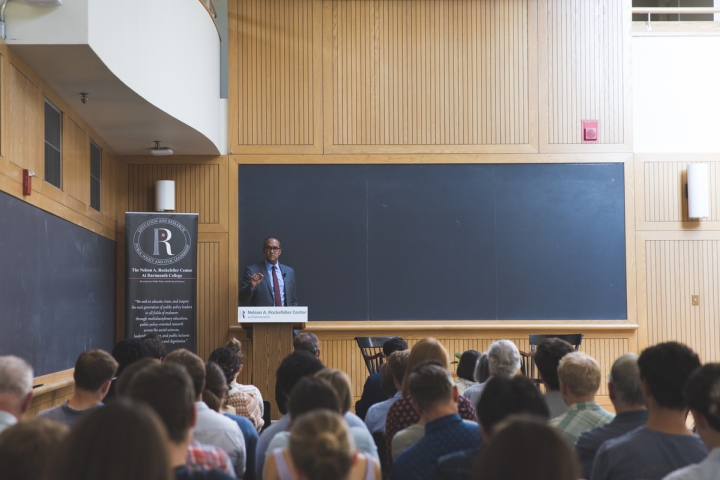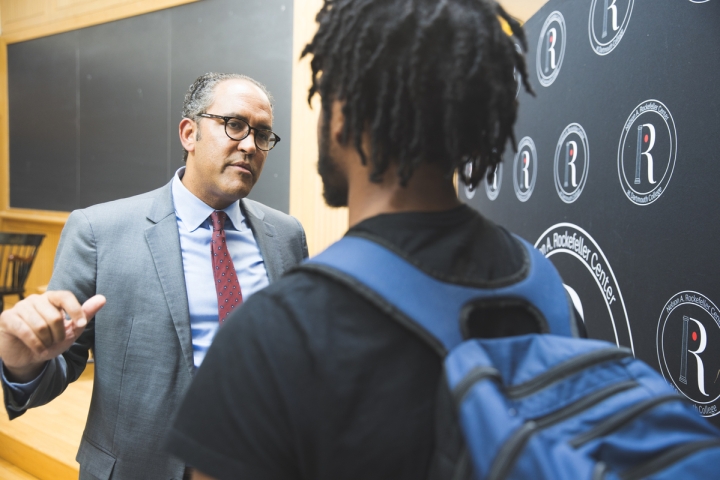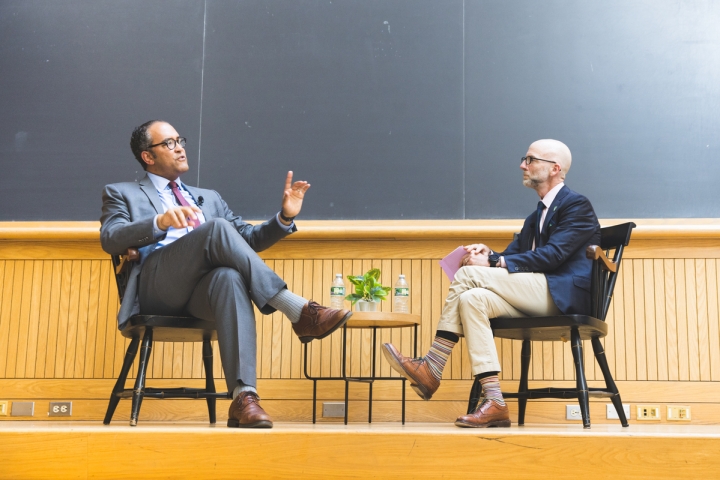At a campaign stop on campus Thursday evening, Republican presidential candidate Will Hurd laid out his vision for harnessing the accelerating power of technology to enhance education, government, and democracy and also welcomed the chance to raise the level of discussion as the first participant in Dartmouth’s Path to the Presidency series.
“What I’m going to do today is potentially set the tone for when other candidates come,” said Hurd, who served three terms in the U.S. House representing a swing district in Texas. “Let’s talk about policy. Let’s talk about real issues and show some level of understanding of complex issues.”
A former CIA officer who is now a cybersecurity executive, Hurd told the crowd of about 50 in Hinman Forum at the Nelson A. Rockefeller Center for Public Policy, as well as some 30 people viewing online, that he was happy to be at Dartmouth, where the term artificial intelligence was coined in 1956.
As an expert in the field of AI and cybersecurity, Hurd said his campaign is focused on “policy initiatives that we should be doing to take advantage of AI before it takes advantage of us.”
AI can help level the income gap by broadening access to education, he said. If deployed wisely, it can make government more efficient and accessible, and it can be a powerful tool for research and medicine, but Congress and the president must regulate its development so that developers are subject to the rule of law, and those principles are built into the system, Hurd said.

Event moderator Justin Anderson, vice president for communications and a former ABC News editor, producer, and reporter who covered presidential campaigns in 2000, 2004, and 2008, welcomed the Dartmouth community members and thanked Hurd for sharing his vision for the country at the Path to the Presidency series.
“Events like this with the congressman are truly part of what makes Dartmouth special and frankly what makes New Hampshire special, particularly at this time of year,” Anderson said. “There’s a nontrivial chance that the next president of the United States will come to the Dartmouth campus and attend events like this.”
In response to a question about border security from Anderson, Hurd called the policies of both Joe Biden and Donald Trump utter failures and said he would make sure that people crossing the border would not be swept into the asylum process if their reason for coming to the United States was economic and not political.
To a student’s question on the environment, Hurd replied, “Climate change is real,” and said he supports a balanced approach that includes fostering America’s green-energy technology industry, short-term use of carbon capture technology, and accelerating the development of nuclear fusion over the next decade, while not restricting the oil and gas industry.
About America’s role in the world, Hurd said, “Being connected to national security for the last 22 years, I have a simple formula. Your friends should love you and your enemies should fear you. That also requires that you know who are your friends and who are your enemies.”
“Guess what, Vladimir Putin is not our friend. I wish more people were focused on trying to stop Vladimir Putin than on discriminating against some of my friends in the LQBTQ community,” he added.
The Path to the Presidency
The Path to the Presidency series is co-sponsored by the Rockefeller Center and the Dartmouth Political Union, a nonpartisan, student-run political organization dedicated to open debate from all perspectives.
The Rockefeller Center and the DPU are extending invitations to all declared presidential candidates, Republican, Democrat, and independent, to come speak to students, lay out their vision, and engage in lively, respectful discussions, says Robert Coates, assistant director of the Rockefeller Center.
“Dartmouth and the Rockefeller Center has hosted many prominent New Hampshire first-in-the-nation presidential events over the years,” Coates said. “We are again working to give students unique access to candidates crisscrossing New Hampshire.”

Dylan Griffith ’25, vice president of the DPU, said, “Dartmouth has a role to play in our democracy in maintaining a forum in which the free exchange of ideas can be not only held, but held vigorously.”
And he says that Dartmouth’s place in a first-in-the-nation primary state means students here hold an essential due diligence role.
“Our message to candidates is come to Dartmouth’s campus, we’ll challenge your ideas, we’ll ensure the free exchange of ideas is upheld on college campuses, because that is our mission, and that is a fundamental pillar of a democracy,” Griffith said.
Hurd, who at the time was the lone Black Republican in the U.S. House and had sometimes publicly criticized then-President Trump, opted not to seek re-election in 2020, saying, “It was never my intention to stay in Congress forever, but I will stay involved in politics to grow a Republican Party that looks like America.”
After the Dartmouth event, he joined 25 students who registered for a private dinner and discussion. The event included a question-and-answer period and was closed to the media.
Hurd said he jumped at the invitation. “I’m looking forward to having an in-depth conversation about the things they care about.”
Zoe McGuirk ’25, a student assistant with the Rockefeller Center Public Programs office, helped organize the dinner with students. She says going to school in an early primary state provides a unique opportunity to get a firsthand view of the political process.
“It’s rare to find yourself in such close proximity to presidential candidates in the first place, but being on campus for the primaries provides an even greater degree of accessibility to students wishing to engage in such a meaningful and historic political process,” McGuirk said.
“I think it enriches the student academic experience as well, especially for those studying the social sciences, as it provides a serious level of relevance to what you’re learning in the classroom and makes the impact of your work seem all the more real,” she said.
